Questionyes, she is a Flemish and we keep her on a diet of timothy hay, and some name brand pellets (name im not sure of) and occasionaly carrots, lettuce and many assortments of vegitables.(my brother gives her marshmellows and candy as well besides the fact i tell him no). she had a nest box, but it was a makeshift one that she ended up destoying. She tried to feed them about 3 hours after they were born , which was around four in the morning. Im not quite sure if she knows what to do after she has them...Her cage also is about 29 inches by 16 inches long, but were thinking of giving her the bigger cage which is about four feet long. Im not quite sue if it will make a difference, but maybe it will make her feel more comfortable. Also, we left them alone and covered the cage partially and in the next day, i came in and she got excited and ran to the side of the cage, nearly trampling her kits. I was very worried at that point and my mother suggested hand feeding thme, but we couldnt afford the formula.
AnswerHi Kerri,
Let' discuss diet first. A pet rabbit should have unlimited grass hays (such as timothy, brome, oat, orchard grass, etc,) at all times and limited pellets and fruits/veggies. Your brother needs to stop giving her candy and marshmellows as they can cause severe gastrointestinal issues. While rabbits love sugar, their digestive system can't properly digest refined sugars (or dairy products either) and that can result in the die off of the beneficial bacteria that digests their food. This usually results in a very unhealthy rabbit. That could be part of the reason for your problem. In the days before delivery, you should start adding (slowly over a period of several days) alfalfa hay and increase the pellets to free choice. This is to make additional calories available for her to produce milk. And regarding your pellets...just because they are "name brand" doesn't mean they are quality pellets.
Next, that cage size is not appropriate. That compares to you living in a small bathroom. While they are domesticated, they still don't care much for being confined and that is stressful. I have two Flemish....one is about 30 pounds and the other is around 22 pounds. While they are confined for safety, their "mansion" is a huge dog crate that is over 54" long...and they don't live together, Each has a house this large.
If she gets pregnant again, she needs a large nest box in which to build her nest. They can be purchased at most farm supply stores for a nominal amount. One can also be constructed but it needs to be durable. I would suggest wood as it would be easier and cheaper than fabricating a metal box. She needs a stress free environment in which to feed. In reality, you are technically a predator in her mind...especially in that hormone raged mind after delivering kits. And sometimes young mothers make mistakes but they will learn. Allow her the privacy she naturally desires and let her learn to be a mother. She will probably only nurse once a day. She will not stay with the kits. That is natural behavior. She needs privacy.
As far as hand feeding, I would intervene only if absolutely necessary. Several factors come into play when hand weaning. I have weaned several domestics and hundreds of wild cottontails (I have a domestic rescue and I am also a licensed wildlife rehabilitator). Rabbits do not have a good sucking reflex. Especially with the "pinkies"....it is quite easy for them to aspirate the formula into their lungs. You know that happened when they blow bubbles from their nose while you are feeding them. This results in a medical condition known as aspiration pneumonia....they basically can develop a lower respiratory infection and die from the fluid in their lungs. I routinely insert a feeding catheter directly into their stomach and feed that way..a technique known as "tubing". There is no formula you can buy at a pet store or you can make at home. You hear all sorts of stories from breeders using concoctions made from molasses or karo syrup (makes me cringe) or from pet stores saying use goat's milk or kitten milk replacer. These formulas are not made for rabbits and do not have the appropriate nutrition. A comparison would be to look at your health if you only got bread and water. It usually causes a condition known as Metabolic Bone Disease that stunts their growth and makes their bones very brittle. A rabbit's skeletal system is already quite fragile....and for a Flemish or even a large Flemish mix to have MBD....the results can be devastating. And another hurdle to clear in hand weaning is what I call the "21 day terror"....but it comes a few days later in domestics than cottontails. A rabbit depends on a proper level of beneficial bacteria in it's GI tract to digest food. As the baby weans, the climate in the gut changes too rapidly for the delicate base of bacteria....the bacteria dies which essentially will give the rabbit an upset stomach....and that can quickly cause death...it's that serious. The ocndition is called cecal dysbiosis. The initial base of bacteria comes from the mother in the form of cecals...or some call night poops. Rabbits practice coprography. They have a special poop called cecatropes that they excrete and eat. This allows them to extract as much nutrition from things like hay as they can get (that is also why they don't need a lot of proteins like pellets in their diet). They eat their mother's cecals during nursing. If they don't get these cecals, it is very difficult to get a "ready gut" and have a successful weaning.
Now that I am sure I have totally confused you...read over this several times. It is a lot of information to digest at once. I will be waiting to hear back from you as I feel sure you will have more questions. Rabbits are quite complicated aren't they?
Randy

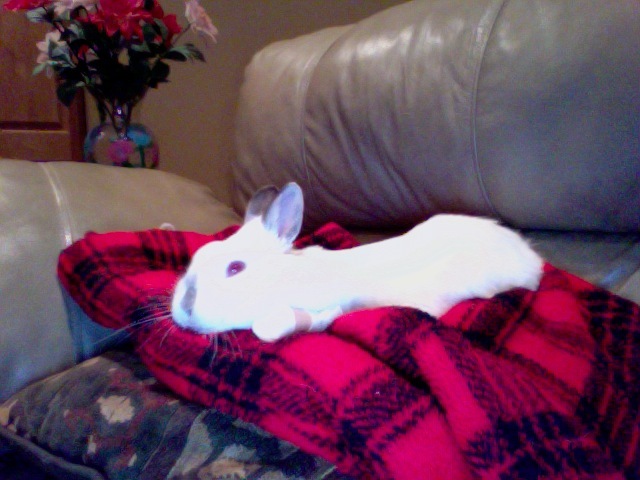 rabbit help.
QuestionSnowball, the rabbit.
QUESTION: We gave
rabbit help.
QuestionSnowball, the rabbit.
QUESTION: We gave
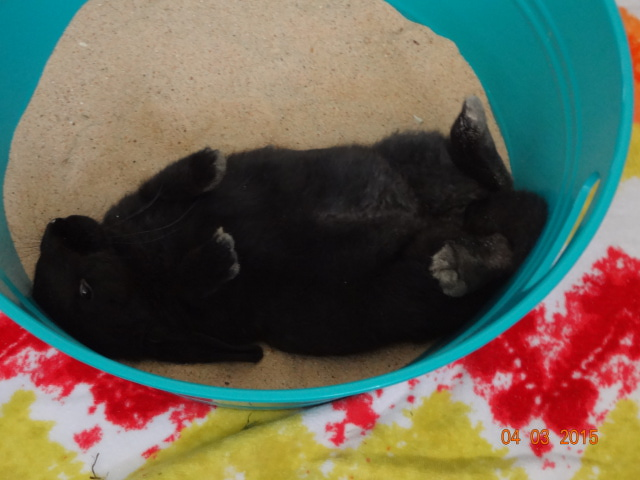 Hard Stomach
Question
Her in Sand :)
Short version: My rabbit
Hard Stomach
Question
Her in Sand :)
Short version: My rabbit
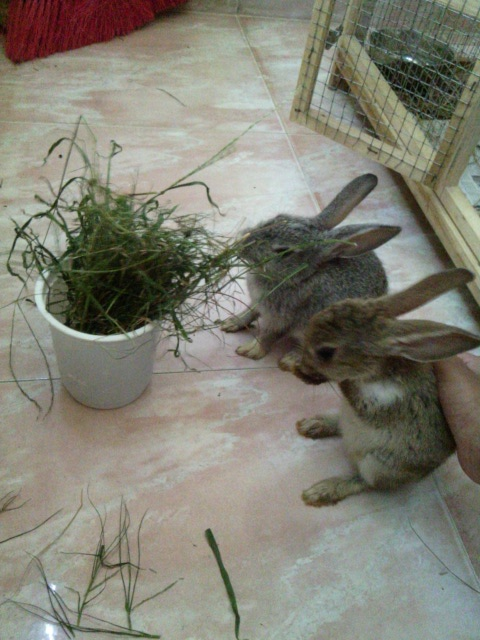 type of rabbit
Question
my bunnies
Hi,I got 2 rabbits from a fr
type of rabbit
Question
my bunnies
Hi,I got 2 rabbits from a fr
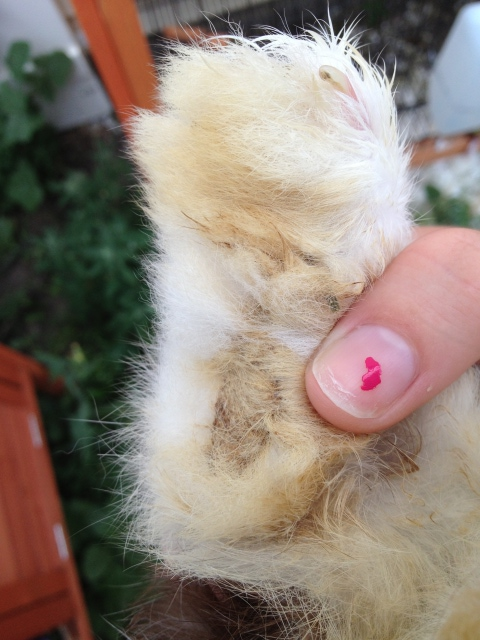 Possible Sore Hock HELP
Question
foot
I bought this rabbit in June.. He
Possible Sore Hock HELP
Question
foot
I bought this rabbit in June.. He
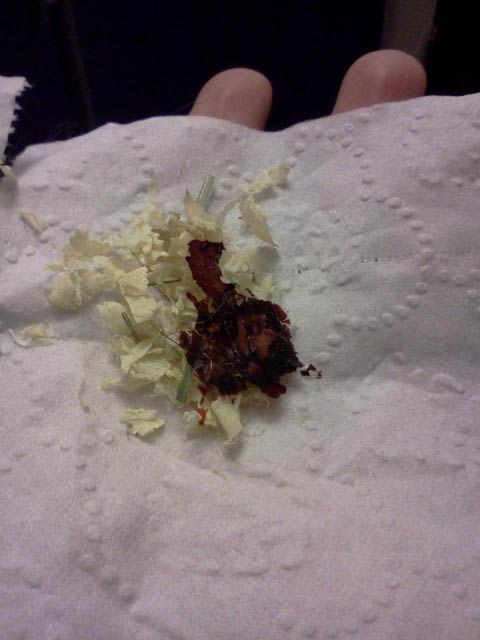 Red in litter box
Question
Red chip
Hello!
Two night ago, my frien
Red in litter box
Question
Red chip
Hello!
Two night ago, my frien